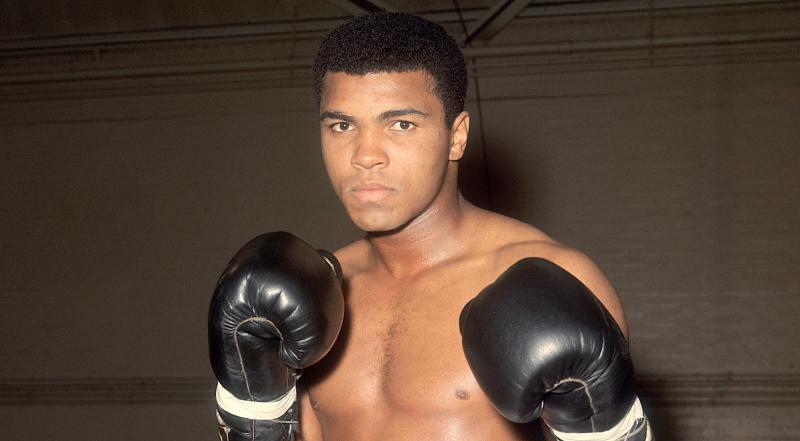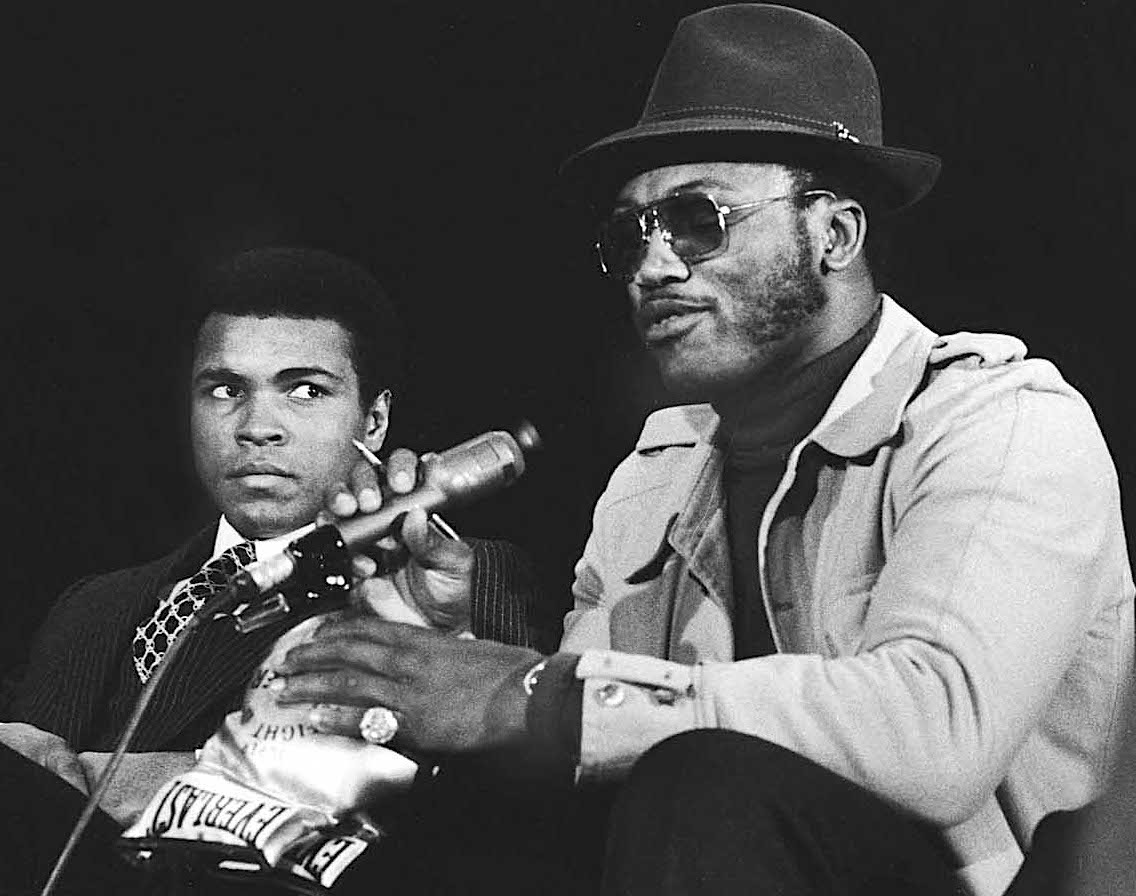What's My Name: Muhammad Ali, Sky Atlantic review - why they called him The Greatest | reviews, news & interviews
What's My Name: Muhammad Ali, Sky Atlantic review - why they called him The Greatest
What's My Name: Muhammad Ali, Sky Atlantic review - why they called him The Greatest
Portrait of the boxing legend and his place in American history

As Anthony Joshua’s shock defeat by the unfancied Andy Ruiz Jr suggests, heavyweight boxers ain’t what they used to be.
The boxer formerly known as Cassius Clay was born in Louisville, Kentucky in January 1942. He changed his name after he’d defeated world champion Sonny Liston in 1964 and converted to Islam – his close association with the Nation of Islam was controversial back then, and would have been catclysmic in today’s climate – and became a sensation not just for his boxing, but for his motormouth boastfulness and gift for self-mythologising rap-style poetry.
Fuqua’s film was made in cooperation with the Ali estate and makes no attempt to probe his private life, concentrating instead on his fights and his public persona. It was compiled from 1,000 hours of video and audio material, and uses clips from Ali’s interviews to construct the narrative rather than an outside narrator (pictured below, Ali with Joe Frazier).
 As well as a portrait of Ali, the film is a powerfully evocative reminder of some of the most tumultuous decades in American history, blighted as they were by racial conflict, assassinations and the Vietnam war. The young Clay was an exuberant interviewee with a shrewd wit, and frequently made sharp observations about America’s racial divide (why couldn’t you use the word “whitemail” instead of “blackmail”, he wondered, and why he was barred from eating in a restaurant in his home town after he’d just won an Olympic gold medal?). There’s a startling sequence where Ali was so infuriated by his opponent Ernie Terrell insisting on calling him Cassius Clay that he denounced him as “an old Uncle Tom”, and promised to punish him in the ring. He duly did so, keeping up a furious running commentary and yelling “what’s my name?” as he rained punches on the unfortunate Terrell.
As well as a portrait of Ali, the film is a powerfully evocative reminder of some of the most tumultuous decades in American history, blighted as they were by racial conflict, assassinations and the Vietnam war. The young Clay was an exuberant interviewee with a shrewd wit, and frequently made sharp observations about America’s racial divide (why couldn’t you use the word “whitemail” instead of “blackmail”, he wondered, and why he was barred from eating in a restaurant in his home town after he’d just won an Olympic gold medal?). There’s a startling sequence where Ali was so infuriated by his opponent Ernie Terrell insisting on calling him Cassius Clay that he denounced him as “an old Uncle Tom”, and promised to punish him in the ring. He duly did so, keeping up a furious running commentary and yelling “what’s my name?” as he rained punches on the unfortunate Terrell.
Fuqua (who directed the Jake Gyllenhaal boxing drama Southpaw) has an obvious affinity for the sport, skilfully blending fight footage with music or Ali’s poetry, and also extracting full value from some superb black and white still photographs taken ringside. Milestone moments like Ali’s refusal to be drafted to the Vietnam war on religious grounds – which cost him four years of his boxing career, but helped to make him a counterculture icon and a beacon of the Civil Rights movement – are a testament to his towering stature.
The future of Arts Journalism
You can stop theartsdesk.com closing!
We urgently need financing to survive. Our fundraising drive has thus far raised £49,000 but we need to reach £100,000 or we will be forced to close. Please contribute here: https://gofund.me/c3f6033d
And if you can forward this information to anyone who might assist, we’d be grateful.

Subscribe to theartsdesk.com
Thank you for continuing to read our work on theartsdesk.com. For unlimited access to every article in its entirety, including our archive of more than 15,000 pieces, we're asking for £5 per month or £40 per year. We feel it's a very good deal, and hope you do too.
To take a subscription now simply click here.
And if you're looking for that extra gift for a friend or family member, why not treat them to a theartsdesk.com gift subscription?
more TV
 Black Rabbit, Netflix review - grime and punishment in New York City
Jude Law and Jason Bateman tread the thin line between love and hate
Black Rabbit, Netflix review - grime and punishment in New York City
Jude Law and Jason Bateman tread the thin line between love and hate
 The Hack, ITV review - plodding anatomy of twin UK scandals
Jack Thorne's skill can't disguise the bagginess of his double-headed material
The Hack, ITV review - plodding anatomy of twin UK scandals
Jack Thorne's skill can't disguise the bagginess of his double-headed material
 Slow Horses, Series 5, Apple TV+ review - terror, trauma and impeccable comic timing
Jackson Lamb's band of MI5 misfits continues to fascinate and amuse
Slow Horses, Series 5, Apple TV+ review - terror, trauma and impeccable comic timing
Jackson Lamb's band of MI5 misfits continues to fascinate and amuse
 Coldwater, ITV1 review - horror and black comedy in the Highlands
Superb cast lights up David Ireland's cunning thriller
Coldwater, ITV1 review - horror and black comedy in the Highlands
Superb cast lights up David Ireland's cunning thriller
 Blu-ray: The Sweeney - Series One
Influential and entertaining 1970s police drama, handsomely restored
Blu-ray: The Sweeney - Series One
Influential and entertaining 1970s police drama, handsomely restored
 I Fought the Law, ITVX review - how an 800-year-old law was challenged and changed
Sheridan Smith's raw performance dominates ITV's new docudrama about injustice
I Fought the Law, ITVX review - how an 800-year-old law was challenged and changed
Sheridan Smith's raw performance dominates ITV's new docudrama about injustice
 The Paper, Sky Max review - a spinoff of the US Office worth waiting 20 years for
Perfectly judged recycling of the original's key elements, with a star turn at its heart
The Paper, Sky Max review - a spinoff of the US Office worth waiting 20 years for
Perfectly judged recycling of the original's key elements, with a star turn at its heart
 The Guest, BBC One review - be careful what you wish for
A terrific Eve Myles stars in addictive Welsh mystery
The Guest, BBC One review - be careful what you wish for
A terrific Eve Myles stars in addictive Welsh mystery
 theartsdesk Q&A: Suranne Jones on 'Hostage', power pants and politics
The star and producer talks about taking on the role of Prime Minister, wearing high heels and living in the public eye
theartsdesk Q&A: Suranne Jones on 'Hostage', power pants and politics
The star and producer talks about taking on the role of Prime Minister, wearing high heels and living in the public eye
 King & Conqueror, BBC One review - not many kicks in 1066
Turgid medieval drama leaves viewers in the dark
King & Conqueror, BBC One review - not many kicks in 1066
Turgid medieval drama leaves viewers in the dark
 Hostage, Netflix review - entente not-too-cordiale
Suranne Jones and Julie Delpy cross swords in confused political drama
Hostage, Netflix review - entente not-too-cordiale
Suranne Jones and Julie Delpy cross swords in confused political drama
 In Flight, Channel 4 review - drugs, thugs and Bulgarian gangsters
Katherine Kelly's flight attendant is battling a sea of troubles
In Flight, Channel 4 review - drugs, thugs and Bulgarian gangsters
Katherine Kelly's flight attendant is battling a sea of troubles

Add comment